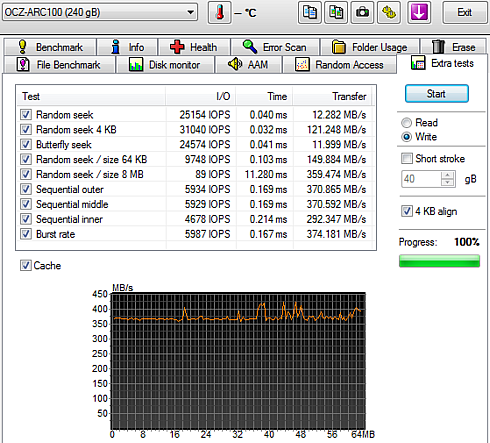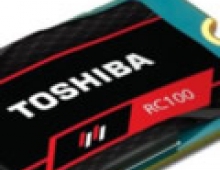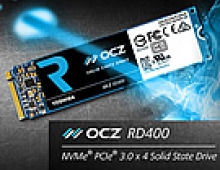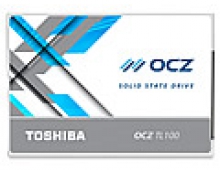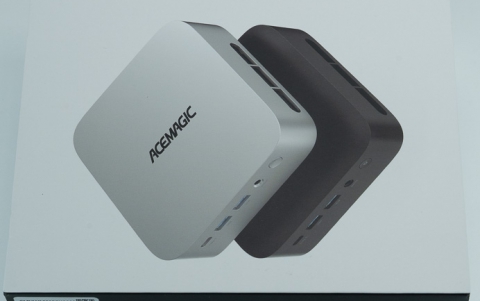OCZ Arc 100 240GB SSD review
3. HDTachRW, HD Tune
Here is our testbed:
- Shuttle SH81R4
- Processor: Intel i7 4790
- Graphics card: Club3D Radeon HD 6790 CoolStream Edition
- Memory: 2x8GB RAM DDR3-1600 Crucial
- SSD: 512GB Crucial MX100
- Monitor: LG L246WH-BH 24"
- Windows 7 x64 SP1 with latest updates installed
For the tests, we used the following software:
- HDTachRW v3.0.1.0
- HD Tune v4.50 Pro
- Crystal DiskMark v3
- ATTO Disk Benchmark v2.46
- ASS SSD Benchmark 1.5xxx
- IOMeter v2006.07.27 with Xtreme Benchmark template
- PCMark Professional edition v1.04
- Anvil Storage Utilities 1.0.34. Beta 11
We start the tests with the HDTachRW software. The software measures the sequential read speed, the random access speed and sequential write speed of a drive.

After some preconditioning with sequential and random data, we ran HD TachRW to see the true 128KB block transfers with sequential data. The software returned average speeds of 282.8 MB/s and 294.5MB/s for read and write, respectively. Although the reading speed was consistent throughout the SSD, the writing speed dropped to 200/MB/s at around the 137 GB mark.
The OCZ ARC 100's performance here isn't that far off from OCZ's flagship Vector 150 and even closer to the Vertex 460.
Remember that the HDTachRW feeds the tested drive a continuous string of small sequential requests. It doesn't equate to real-world maximum throughput, but it does mean something for analysis.
We move on to the HD Tune Pro software, another utility we used to measure the drive's reading and writing performances. Although not necessarily representative of real-world workloads, HD Tune's targeted tests give us a glimpse of each drive's raw capabilities.
The OCZ ARC 240 GB read the data sequentially at 246.6 MB/s (average):
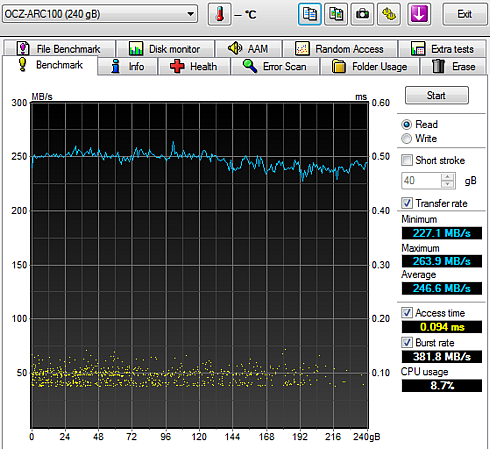
The drive also returned a 293.6 MB/s sequential write speed, confirming the previous HDTachRW result:

Below you see random reading test. The OCZ ARC SSD gave a 327.4 MB/s average reading speed for an 1MB transfer size and a 309.6 MB/s average reading for transferring files with random sizes. We expected a higher performance here.
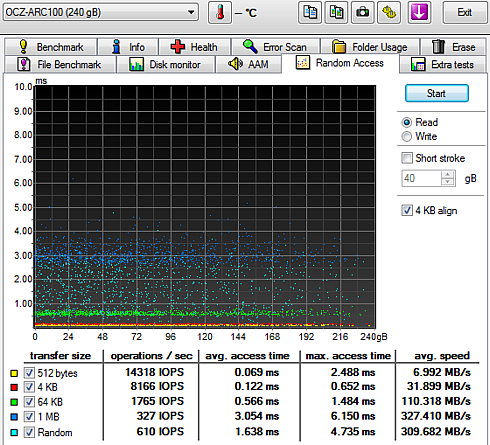
In the corresponding random write test, the drive was faster giving 430MB/s in the test with random files and 463 MB/s with 1MB files.

HD Tune's file benchmark also features three data patterns available that can be used during the write process: zero, random and mixed, which is a combination of zeroes and random data. Certain SSDs use a compression technique which improves performance when compressible data is used. For these devices the results will be highest when writing zeroes and lowest when writing random data.
Let's start with a sequential transfer speed of a 500MB file using zeros in the writing part:
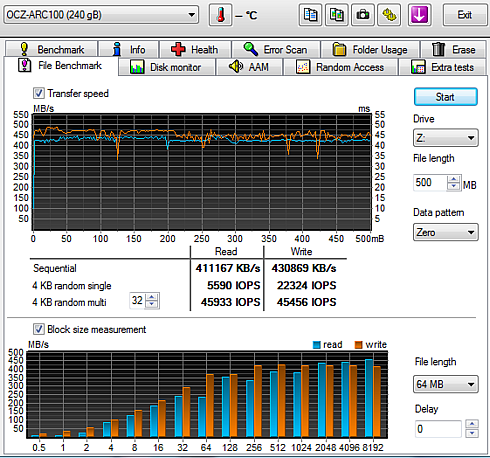
The OCZ ARC SSD read the 500MB file at an average speed of 411 MB/s and wrote the file at 430 MB/s . The 4K random single performance with 4096 byte blocks was just 5590 IOPS for reading and 22324 IOPS for writing. When we enabled the 32 requests option, both figures reached the 45993 IOPS and 45456 IOPS for read/write, respectively.
Selecting the "Random" data pattern (zeroes and data) changed the results a bit, with the sequential write speed to take a hit.

Selecting the "mixed" data pattern "restored" the sequential speeds to the expected levels but again, the 4K random read performance was low at 5945 IOPs.

Below you see some additional sequential and random reading and writing tests:

